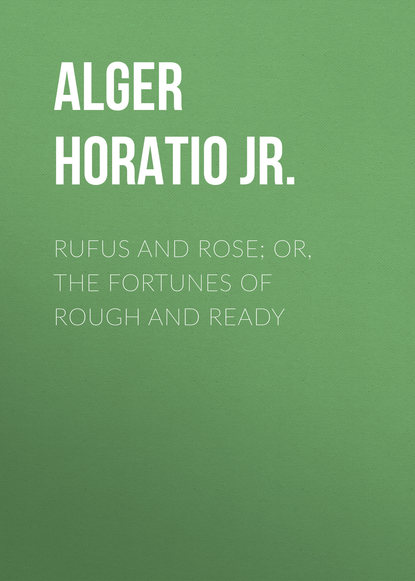По всем вопросам обращайтесь на: info@litportal.ru
(©) 2003-2024.
✖
Rufus and Rose; Or, The Fortunes of Rough and Ready
Настройки чтения
Размер шрифта
Высота строк
Поля
"You're a humbug!" said Martin, indignantly. "What's the man's name he works for?"
"It's painted in big letters on the sign. You can't miss it."
James Martin considered, for an instant, whether it would be best to give Ben a thrashing, but the approach of a policeman led him to decide in the negative.
"Shine yer boots, gov'nor?" asked Ben, professionally.
"Yes," said Martin, rather unexpectedly.
"Payment in advance!" said Ben, who didn't think it prudent to trust in this particular instance.
"I'll tell yer what," said Martin, to whom necessity had taught a certain degree of cunning, "if you'll lend me fifty cents for a week, I'll let you shine my boots every day, and pay you the money besides."
"That's a very kind proposal," said Ben; "but I've just invested all my money on a country-seat up the river, which makes me rather short."
"Then you can't lend me the fifty?"
"No, but I'll tell you where you can get it."
"Where?"
"Up in Chatham Street. There's plenty'll lend it on the security of that hat of yours."
The hat in question was in the last stages of dilapidation, looking as if it had been run over daily by an omnibus, and then used to fill the place of a broken pane, being crushed out of all shape and comeliness.
Martin aimed a blow at Ben, but the boot-black dexterously evaded it, and, slinging his box over his back, darted down Nassau Street.
Later in the day he met Rough and Ready.
"I see the gov'nor this mornin'," said Ben.
"What, Mr. Martin?"
"Yes."
"What did he say?"
"He inquired after you in the most affectionate manner, and wanted to know where you was at work."
"I hope you didn't tell him."
"Not if I know myself. I told him he'd see the name on the sign. Then he wanted to borrow fifty cents for a week."
Rufus laughed.
"It's a good investment, Ben. I've invested considerable money that way. I suppose you gave him the money?"
"Maybe I did. He offered me the chance of blacking his boots every day for a week, if I'd lend him the money; but I had to resign the glorious privilege, not havin' been to the bank this mornin' to withdraw my deposits."
"You talk like a banker, Ben."
"I'm goin' to bankin' some day, when boot-blacking gets dull."
Ben Gibson had been for years a boot-black, having commenced the business when only eight years old. His life had been one of hardship and privation, as street life always is, but he had become toughened to it, and bore it with a certain stoicism, never complaining, but often joking in a rude way at what would have depressed and discouraged a more sensitive temperament. He was by no means a model boy, though not as bad as many of his class. He had learned to smoke and to swear, and did both freely. But there was a certain rude honesty about him which led Rufus, though in every way his superior, to regard him with friendly interest, and he had, on more than one occasion, been of considerable service to our hero in his newsboy days. Rufus had tried to induce him to give up smoking, but thus far without success.
"It keeps a feller warm," he said; "besides it won't hurt me. I'm tough."
CHAPTER IV.
HOW JAMES MARTIN CAME TO GRIEF
After parting with Ben Gibson, James Martin crossed the street to the City Hall Park, and sat down on one of the wooden benches placed there for the public accommodation. Neither his present circumstances nor his future prospects were very brilliant. He was trying to solve the great problem which has troubled so many lazy people, of how best to live without work. There are plenty of men, not only in our cities, but in country villages, who are at work upon this same problem, but few solve it to their satisfaction. Martin was a good carpenter, and might have earned a respectable and comfortable livelihood, instead of wandering about the streets in ragged attire, without a roof to shelter him, or money to pay for a decent meal.
As he sat on the bench, a cigar-boy passed him, with a box of cigars under his arm.
"Cigars," he cried, "four for ten cents!"
"Come here, boy," said Martin. The boy approached.
"I want a cigar."
"I don't sell one. Four for ten cents."
Martin would willingly have bought four, but as his available funds amounted only to four cents, this was impossible.
"I don't want but one; I've only got four cents in change, unless you can change a ten-dollar bill."
"I can't do that."
"Here, take three cents, and give me a prime cigar."
"I'll sell you one for four cents."
"Hand over, then."
So Martin found himself penniless, but the possessor of a cigar, which he proceeded to smoke with as much apparent enjoyment as if he had a large balance to his credit at the bank.
He remained in the Park till his cigar was entirely smoked, and then sauntered out with no definite object in view. It occurred to him, however, that he might as well call on the keeper of a liquor saloon on Baxter Street, which he had frequently patronized.
"How are you, Martin?" asked "Jim," that being the name by which the proprietor was generally known.
"Dry as a fish," was the suggestive reply.
"Then you've come to the right shop. What'll you have?"
Martin expressed his desire for a glass of whiskey, which was poured out, and hastily gulped down.
"I'm out of stamps," said Martin, coolly. "I s'pose you'll trust me till to-morrow."











